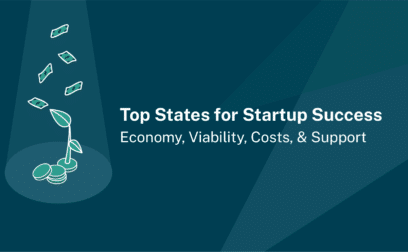TABLE OF CONTENTS
While the state is known for its agriculture and farming industry, there is still plenty of opportunity to start any kind of small business in North Dakota. There are also many ways to finance your small business to help it grow and thrive.
Learn more about small business loans in North Dakota as well as alternative financing options.
A popular way to finance a small business is to take out a business loan. Small business owners in North Dakota can turn to several business loan options to finance their businesses. The three most common loan types include:
Each loan type has different advantages as well as qualification requirements and will suit different types of small businesses. Bank loans tend to offer competitive interest rates and repayment terms, but may have stricter qualifications, such as credit history and length of time in business, to ensure the creditworthiness (ability to repay) of the borrower.
SBA loans are backed by the U.S. government, which makes them less risky for lenders, but they are very competitive. There are many different loan programs under the SBA, including the popular 7(a) program, the 504/CDC program for commercial real estate and property improvement and microloans for smaller businesses.
Alternative loans and online loans can be easier to secure with lower credit requirements and shorter application and approval times. However, they also often have much higher interest rates and shorter repayment terms to make up for the risk they take on. Equipment financing allows businesses to buy equipment by obtaining a loan that uses the equipment itself as collateral. This can be a good option for companies needing specific machinery or technology such as farm equipment or vehicle fleets. Many lenders specialize in equipment lending for specific industries.
A business grant is another popular way for a business to fund its growth, with a lump sum of money that doesn’t have to be repaid. They’re offered by various groups such as government agencies, economic development groups, community or nonprofit organizations and business incubators. Many grants have specific focus areas, such as job creation, technology innovation or community development, but every grant is likely to be highly competitive, so aligning your business goals with the grant’s objectives is important.
To find a business grant in North Dakota, start by researching government agencies at the federal, state, and local levels, such as the North Dakota Department of Commerce, to discover grant programs supporting small businesses. Additionally, explore non-profit organizations, industry-specific associations and private foundations that may offer grants or financial assistance.
Networking within the local business community and attending relevant events can also provide valuable insights into potential grant opportunities. Chambers of commerce, business development centers and economic development organizations in North Dakota may offer information and guidance on available grants.
Lastly, consider consulting with a small business advisor or reaching out to the North Dakota Small Business Development Center for personalized guidance on finding and applying for business grants in the state. Keep in mind that persistence and attention to detail are key when navigating the process of securing a business grant.
The best way to apply for a small business loan in North Dakota is to approach it strategically. Begin by researching and selecting a suitable lender, based on your business’s financing needs.
Once you’ve identified a potential lender, follow these general steps:
It’s a good idea to maintain open communication with the lender throughout the process and seek professional advice if needed. Each lender may have specific procedures, so it’s important to follow their guidelines closely.
Several alternative business financing options are available for business owners who decide not to get a business loan. One option is peer-to-peer lending, where individuals or investors provide funding to small businesses through online platforms, often with competitive interest rates.
Crowdfunding is another alternative, allowing businesses to raise funds from a large number of people. This method involves offering products, services or equity in return for financial contributions. Also consider angel investors and venture capital which involves seeking funding from individual investors or investment firms. In return, investors may receive equity in the business.
Invoice financing enables businesses to receive immediate cash by selling their outstanding invoices to a third party at a discount. Merchant cash advances are another option, which includes obtaining a lump sum in exchange for a percentage of future daily credit card sales. While quick and accessible, this option tends to have higher costs.
Another option is a business line of credit which offers a revolving credit line that businesses can draw upon as needed. Interest is only paid on the amount borrowed, making it a flexible option for managing cash flow.
It’s important for businesses to carefully assess their financial needs, consider the terms and conditions of each option, and choose the alternative financing option that aligns with their specific circumstances and goals.
The credit score required for a small business loan can vary depending on the lender and the type of loan. Generally, traditional lenders, such as banks, may look for a higher credit score, often in the range of 680 or above. However, alternative lenders and online lending platforms may have more flexible credit score requirements, and some may consider scores as low as 550.
In most cases, a higher credit score increases your chances of getting a loan with favorable interest rates and terms. If your credit score is good or excellent, you may also have some negotiating power with a bank or other lender. Remember that lenders who are willing to lend to borrowers considered less creditworthy because of their credit score also tend to have higher interest rates to make up for their risk.
Keep in mind that different lenders may have different criteria, so researching and understanding the specific requirements of the lender you’re interested in is important. While credit score is a significant factor, lenders typically look at multiple aspects of your financial profile, including your business’s revenue, time in operation and overall financial health. Don’t discount the power of a good business plan in helping you secure a loan.
The typical interest rates on business loans in North Dakota can vary based on several factors, including the borrower’s qualifications, the loan amount and economic factors. This is why comparing loans and lenders is so important to find the right solution for your specific business needs.
Generally, traditional lenders such as banks may offer lower interest rates, often ranging from around 5.75% to 12%, especially for businesses with strong creditworthiness and a stable financial history. SBA loans have interest rates tied to the U.S. Prime rate, and average between 11.5% to 16.5% depending on the loan type.
Alternative lenders, including online lenders and non-bank financial institutions, may provide more accessible financing but often come with higher interest rates, sometimes ranging from 7% to 60% or more. Again, these rates are influenced by factors such as your credit score, business performance and the type of loan.
The time it takes to receive funds for a small business loan can vary depending on several factors, such as the completeness of the application, the complexity of the loan and the lender’s internal processes.
In addition to the application and approval processes, the time it takes to receive funds is influenced by how promptly the borrower can provide required documentation and meet any conditions set by the lender.
Traditional lenders, such as banks, typically have a more extended and thorough application process, which may take several weeks to months. SBA loans typically have long approval and review processes and can take up to six months to fund.
On the other hand, alternative lenders, including online platforms, often offer a quicker turnaround. Some online lenders can approve and disburse funds within a matter of days or even hours. But again, this speed can come with a higher interest rate, so it’s important to make sure you can afford a loan before you sign the paperwork.
To find the best funding for your small business in North Dakota, start by researching available options based on your business’s specific needs. Explore traditional financial institutions like banks and credit unions that offer business loans and check their eligibility criteria, interest rates and terms.
Sometimes local banks can provide better rates than national institutions due to local incentives, but always research all of your options. Additionally, local economic development organizations and chambers of commerce may provide information on special loan programs or grants available in North Dakota.
Make sure you include alternative lending sources, including online lenders and peer-to-peer lending platforms. These options often provide faster application processes and may be more flexible with credit requirements.
Another way to find good funding options is by networking with local business communities as they can provide insights into funding opportunities. Attend industry events, workshops, and seminars to connect with potential lenders, investors, or business advisors who may offer guidance on securing funding.
Use online resources like small business loan comparison websites such as Swoop to compare rates, terms and reviews of different lenders. This can help you make informed decisions based on your business needs and financial situation.
You may consider consulting with a financial advisor or small business development center to get personalized guidance. They can assist in assessing your business’s financial health, identifying suitable funding options and navigating the application process.
Remember to review the terms and conditions of any funding option, including interest rates, repayment terms and potential fees. Taking a comprehensive approach to researching and evaluating funding sources will help you find the best fit for your small business in North Dakota.
Ready to start or grow your business in North Dakota? Swoop is here to support you every step of the way. We provide a wide range of funding options and are ready to assist you with everything you need to grow your business. Get started today.
Daire made it happen! There is no doubt that Swoop sped up the process and found lenders that worked to our time scale rather than the other way round
Hocque Figureoa
Joint owner, F45 Virginia
Swoop was actually very helpful in helping us get our initial fundraising in place. Swoop was able to connect us with investors, with grant financing options and debt financing options.
Viler Lika
Founder, SingleKey
Pedja was amazing. Super supportive, understanding of our needs and wasn't pushy at all. We've been going back and forth with Swoop for over a year inquiring about different financing options and they were patient until we were ready!
Chris Skeates
F45 Multi-studio owner
Join the 95,000+ businesses just like yours getting the Swoop newsletter.
Free. No spam. Opt out whenever you like.
Kingfisher Way, Silverlink Business Park, Newcastle upon Tyne, NE28 9NX, UK
View in Google Maps35 Bull Street, Lewis Building, Birmingham B4 6AF, UK
View in Google MapsAberystwyth Innovation and Enterprise Campus
Gogerddan Campus
Aberystwyth University
Ceredigion
SY23 3EE
Dogpatch Labs, The CHQ Building, Custom House Quay, Dublin, Ireland
View in Google MapsSuite 801, Level 8, 84 Pitt Street, Sydney, NSW 2000, Australia
View in Google Maps43 W 23rd St, New York, NY 10010, United States
View in Google Maps21 Dreyer Street, Cape Town, South Africa, 7708
View in Google MapsClever finance tips and the latest news
Delivered to your inbox monthly
Join the 95,000+ businesses just like yours getting the Swoop newsletter. Free. No spam. Opt out whenever you like.




